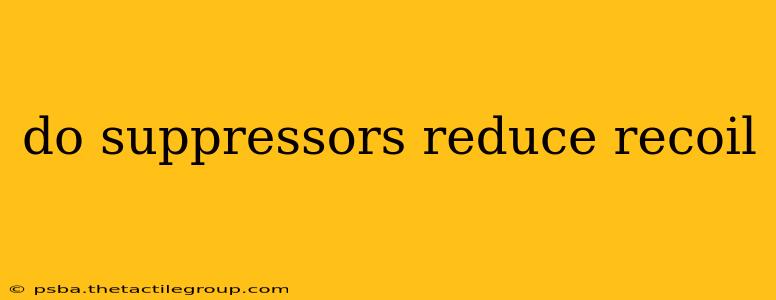Do Suppressors Reduce Recoil? The Surprising Answer
The short answer is: yes, but not significantly. While suppressors, often mistakenly called silencers, don't dramatically reduce felt recoil, they do offer a subtle reduction, and the effect is more complex than you might think. This article will delve into the mechanics of firearm recoil and how suppressors influence it.
Understanding Firearm Recoil
Before understanding the suppressor's role, let's clarify the physics of recoil. Recoil is the backward force experienced by a firearm when it discharges a projectile. This force is governed by Newton's Third Law of Motion: for every action, there's an equal and opposite reaction. The propellant's expansion forces the bullet forward, and an equal and opposite force pushes the gun backward. Several factors contribute to felt recoil, including:
- Caliber: Larger calibers generate more recoil due to the greater momentum of the projectile.
- Powder Charge: A larger powder charge results in a more powerful expulsion and increased recoil.
- Gun Weight: Heavier guns absorb recoil more effectively, making it less noticeable to the shooter.
- Muzzle Brake/Compensator: These devices redirect propellant gases to reduce recoil.
How Suppressors Affect Recoil
A suppressor, unlike a muzzle brake or compensator, primarily reduces the sound of a firearm. However, its design can indirectly influence recoil. The suppressor adds weight to the muzzle, and this additional weight slightly reduces the perceived recoil. It's a small reduction, often described as a marginal difference rather than a dramatic change.
Furthermore, the suppressor's internal baffles and design can affect the expulsion of gases. Some designs might subtly alter the direction of gas flow, offering a minor reduction in recoil. However, this effect is highly dependent on the suppressor's design and the firearm itself. There's no guarantee of substantial recoil reduction, and it’s often not the primary purpose of a suppressor.
Other Factors Affecting Perceived Recoil
The perceived recoil is subjective and influenced by many factors beyond the suppressor's role. These include:
- Shooter's Stance: Proper shooting technique significantly minimizes felt recoil.
- Ammunition Type: Different ammunition loads can affect recoil, even with the same firearm and suppressor.
- Individual Sensitivity: Some shooters are more sensitive to recoil than others.
Conclusion: Slight Reduction, Not a Major Impact
While a suppressor might slightly reduce felt recoil due to added weight and potential gas redirection, it's not its primary function, and the reduction is often negligible. If significant recoil reduction is a priority, consider muzzle brakes or compensators specifically designed for that purpose. Suppressors are primarily for sound reduction, offering a secondary, minor effect on recoil. Don't expect a dramatic change in felt recoil when adding a suppressor to your firearm.

